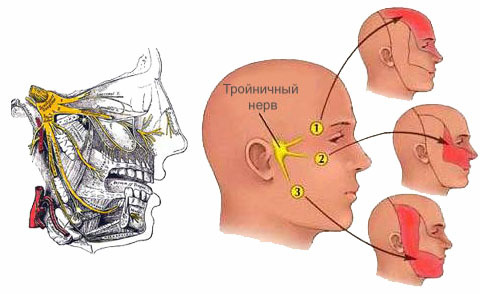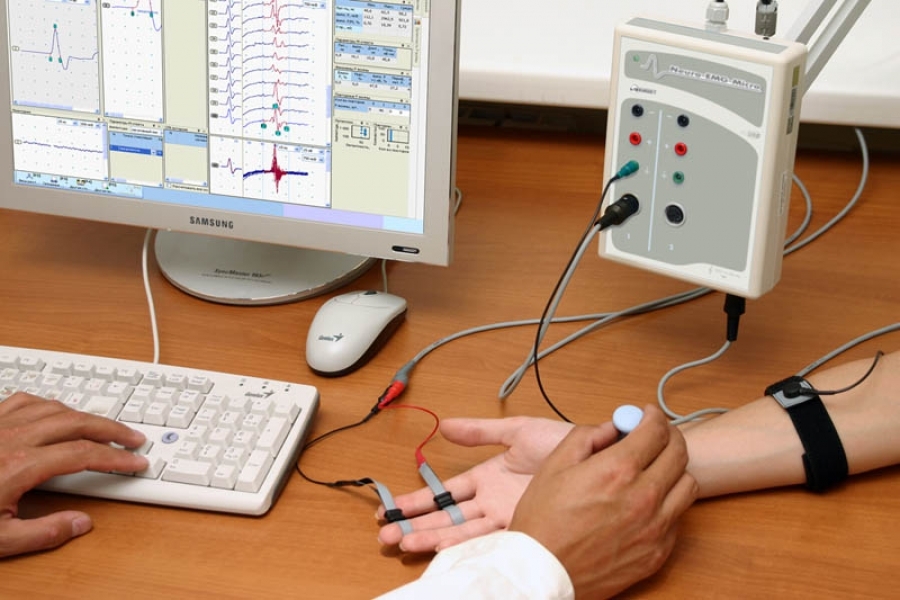How much to sleep: the rules of a healthy sleep
 Are you sleeping correctly?How fully do you rest during sleep?What happens in the body when we sleep?These questions are natural, because in a dream a person spends about 24 years of life!Agree, you need to make the most out of this maximum benefit - well, you can not spend 24 years of life somehow.Scientists conduct numerous studies of sleep, doctors use therapeutic sleep in their work, even folk healers claim that sleep is health.But conjectures are conjectures, and in the study of the topic it is possible and necessary to rely only on scientific facts.
Are you sleeping correctly?How fully do you rest during sleep?What happens in the body when we sleep?These questions are natural, because in a dream a person spends about 24 years of life!Agree, you need to make the most out of this maximum benefit - well, you can not spend 24 years of life somehow.Scientists conduct numerous studies of sleep, doctors use therapeutic sleep in their work, even folk healers claim that sleep is health.But conjectures are conjectures, and in the study of the topic it is possible and necessary to rely only on scientific facts.
Overpowing or nedosyp - which is better
How much sleep do you need to sleep?Almost everyone knows that a night's sleep should last at least 8 hours - that's what doctors tell us.Indeed, many of us will agree that only after an 8-hour sleep they feel rested.And it's even better to sleep 9-10 hours. .. But the psychiatrist, Professor Daniel Kripke specially conducted research on the duration of sleep and made an interesting conclusion:
People who sleep from 6.5 to 7.5 hours a day live longer.They are more productive and happy.And excessive sleep can even be harmful to health.And you can feel worse by sleeping 8.5 hours than if you had overslept. 5.
Try to experiment on yourself and sleep 8 hours, and only 7.5 - just listen carefully to your inner state, to well-being.Kripke claims that the body feels more energetic in this mode of sleep, the person is ready to literally "fold mountains", and the mood will be excellent.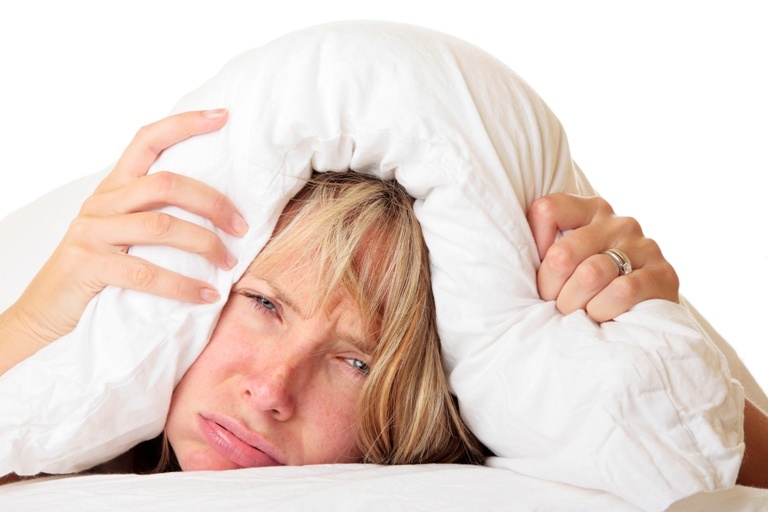 Do you often settle for 4 hours of night sleep and consider yourself a hero?You are mistaken!Nedosyp is also bad, as well as overfilling.And, for certain it is not known what will affect the health more negatively.It's like choosing the size of underwear - each person needs an individual approach.Therefore, you should gently and unobtrusively experiment with your own organism - if you sleep 8 or more hours every night, then reduce this time for half an hour boldly.Do you feel that 7, 5 hours is enough for rest?Try another half an hour to reduce the length of the rest. Important: less than 6 hours of night sleep - it's harmful.Therefore, when experimenting, do not overdo it - you need to find a "golden mean". An interesting fact - a person who has slept for 4 hours, will be quite adequate and even attentive enough that it can be compared with a person who slept for 7, 5 hours.And even the tests / exercises performed by these two people will give the same results.What's the catch?The fact is that even with full rash periodically the human brain loses focus on the task.And here there is a difference between two people, which is said at the beginning - with a full amount of sleep, the brain returns attention, if "on the face" is not enough, then there will be no refocusing.In order not to press scientific terms on you, readers, but to convey the thought, you can formulate this:
Do you often settle for 4 hours of night sleep and consider yourself a hero?You are mistaken!Nedosyp is also bad, as well as overfilling.And, for certain it is not known what will affect the health more negatively.It's like choosing the size of underwear - each person needs an individual approach.Therefore, you should gently and unobtrusively experiment with your own organism - if you sleep 8 or more hours every night, then reduce this time for half an hour boldly.Do you feel that 7, 5 hours is enough for rest?Try another half an hour to reduce the length of the rest. Important: less than 6 hours of night sleep - it's harmful.Therefore, when experimenting, do not overdo it - you need to find a "golden mean". An interesting fact - a person who has slept for 4 hours, will be quite adequate and even attentive enough that it can be compared with a person who slept for 7, 5 hours.And even the tests / exercises performed by these two people will give the same results.What's the catch?The fact is that even with full rash periodically the human brain loses focus on the task.And here there is a difference between two people, which is said at the beginning - with a full amount of sleep, the brain returns attention, if "on the face" is not enough, then there will be no refocusing.In order not to press scientific terms on you, readers, but to convey the thought, you can formulate this:
The brain of an undersized person is working normally, but from time to time something similar to a power failure occurs in an electrical appliance.
The citation belongs to Clifford Saper: a professor from Harvard, together with a team of other scientists engaged in the study of sleep.Just look at the table below: 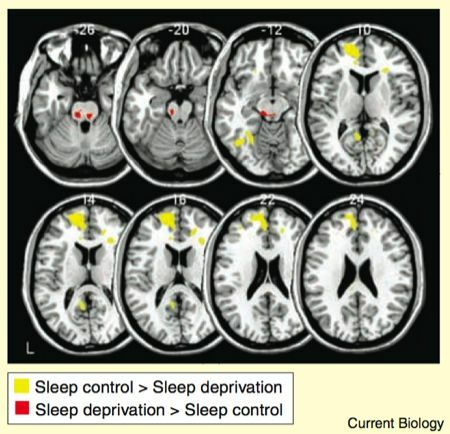 Once a person loses focus, the activation processes automatically begin in the brain - they are indicated in yellow in the figure.If a person has not slept, then this activity is very weak, or is completely absent.But the so-called "center of fear" starts( the amygdala - on the table they are highlighted in red) and the brain works in a specific mode - as if a person is in danger from all sides.Physiologically this is manifested by paleness sweating, rapid breathing, rumbling and colic in the abdomen, tension of individual muscle groups. Important: the danger of lack of sleep lies in the fact that a person, losing focus and focus, does not suspect this.He believes that he adequately reacts to the circumstances, his productivity does not suffer.That's why doctors recommend to give up driving a vehicle in case of lack of sleep.
Once a person loses focus, the activation processes automatically begin in the brain - they are indicated in yellow in the figure.If a person has not slept, then this activity is very weak, or is completely absent.But the so-called "center of fear" starts( the amygdala - on the table they are highlighted in red) and the brain works in a specific mode - as if a person is in danger from all sides.Physiologically this is manifested by paleness sweating, rapid breathing, rumbling and colic in the abdomen, tension of individual muscle groups. Important: the danger of lack of sleep lies in the fact that a person, losing focus and focus, does not suspect this.He believes that he adequately reacts to the circumstances, his productivity does not suffer.That's why doctors recommend to give up driving a vehicle in case of lack of sleep.
Studies on the impact of sleep on a person
Conducting research on the impact of sleep on humans has allowed us to make a few staggering conclusions :
- Sleep disturbance, namely, its insufficiency, leads to memory abnormalities.An experiment was conducted with bees - after they were forced to change the habitual route of flying around the territory, disturbance of rest( bees do not sleep in our understanding of this word) led to a loss in space - no representative of these insects could repeat the path of flight, studied forThe day before.
- Lack of sleep leads to increased appetite.This is also confirmed by research, scientists associate such a manifestation of lack of sleep with the stress experienced by a overworked / unresponsive organism.
- Normal, high-grade sleep greatly improves creativity.For example, in a dream the unexpected solutions of global problems are dreaming, an understanding / vision of some theories comes to the person - and you do not need to go far beyond the example: Mendeleev dreamed of a table of chemical elements!
- Sleep disturbance can be caused by increased background lighting in the evening.In this regard, quite serious research was carried out by the medical center at the University of Chicago.It was found that this fact provokes a later retirement, reduces the duration of the sleep phase, which precedes awakening.
In addition, the duration of sleep can affect food preferences.An experiment was conducted with children aged 6-7 years: with regular sleep shortages, children began to consume more meat, carbohydrates and fats, practically forgetting about fruits and vegetables.All this took place against the background of the absence of any dietary regimen - the scientists noted the classic overeating in a group of children under test.It has long been known that the lack of proper sleep adversely affects the neurotransmitters in the brain - they are banally exhausted.Result of such influence can become stress, after all neuroregulators are responsible for good mood.A chain is obtained: lack of sleep-irritability-stress.And the consequence of a stressful condition can be depression - a dangerous and complex condition that must be subjected to professional treatment.
How to adjust sleep
Recommended to read:Pouring - harmful, nedosypat - is also dangerous.What to do and how to determine how much you need to sleep specifically for you?First, if a person feels constant fatigue and always wants to sleep, then this means only one thing - you need to adjust the time of daily sleep.And this does not mean that it is necessary to allocate a day, to get tired of sleep, turning off the phone and the doorbell - this will only have a short-term effect. It is necessary to increase the duration of a night sleep :
- try to stay up as early as possible;
- before going to bed do not watch TV and do not work too hard;
- it is advisable to make a short walk in the fresh air( without beer and strong coffee!) Before going to sleep, you can read a book - is this advice too trivial?But it is very effective - checked, as they say, for years.
Secondly, accustom your body to rest during the day.Some people desperately need to sleep in the daytime for at least one and a half hours - they will feel fine in the evening, do not feel tired.But it is wiser to gradually accustom yourself to rest in the daytime for a maximum of 30 minutes - do not be surprised, such a fast sleep is enough to restore the normal working capacity of the whole organism.Third, you need to adjust the sleep schedule.Lie down and get up at the same time - if this is problematic, then use the alarm clock.And even if at 7 am on call it's very hard to get up, do not stay in bed - a couple of minutes of active wakefulness( going to the toilet, hygienic procedures, preparing coffee and a sandwich) is enough to wake up.If you do not know how much you need to sleep on time, then pay attention to the data below:
| Age / position | Sleep duration recommended by doctors and scientists |
| Babies | At least 16 hours per day.Most babies need up to 18 hours of sleep per day. |
| Preschool age | Children must sleep at least 11 hours a day.It is better if the child is given an average sleep of 12 hours. |
| School age( up to 15 years) | Schoolchildren must sleep at least 10 hours a day.Given the activity of children and the attendant factors, the duration of sleep can be increased to 12 hours. |
| Adolescence | Sleep takes at least 9 hours a day, but not more than 10 hours. |
| Adults | Daily sleep should take at least 7 hours, ideally you need to sleep 8 hours in a row. |
| Older people | Daily sleep should last 7-8 hours.But given frequent awakenings and intermittent sleep( an age-specific feature), you should definitely rest in the daytime - at least 1 hour. |
| Pregnant women at any time | Sleep time is 8 hours, in the daytime, you should always rest for at least 1 hour, but not more than 2. |
| Patients | Sleep time is 8 hours, additional hours of sleep are needed. |
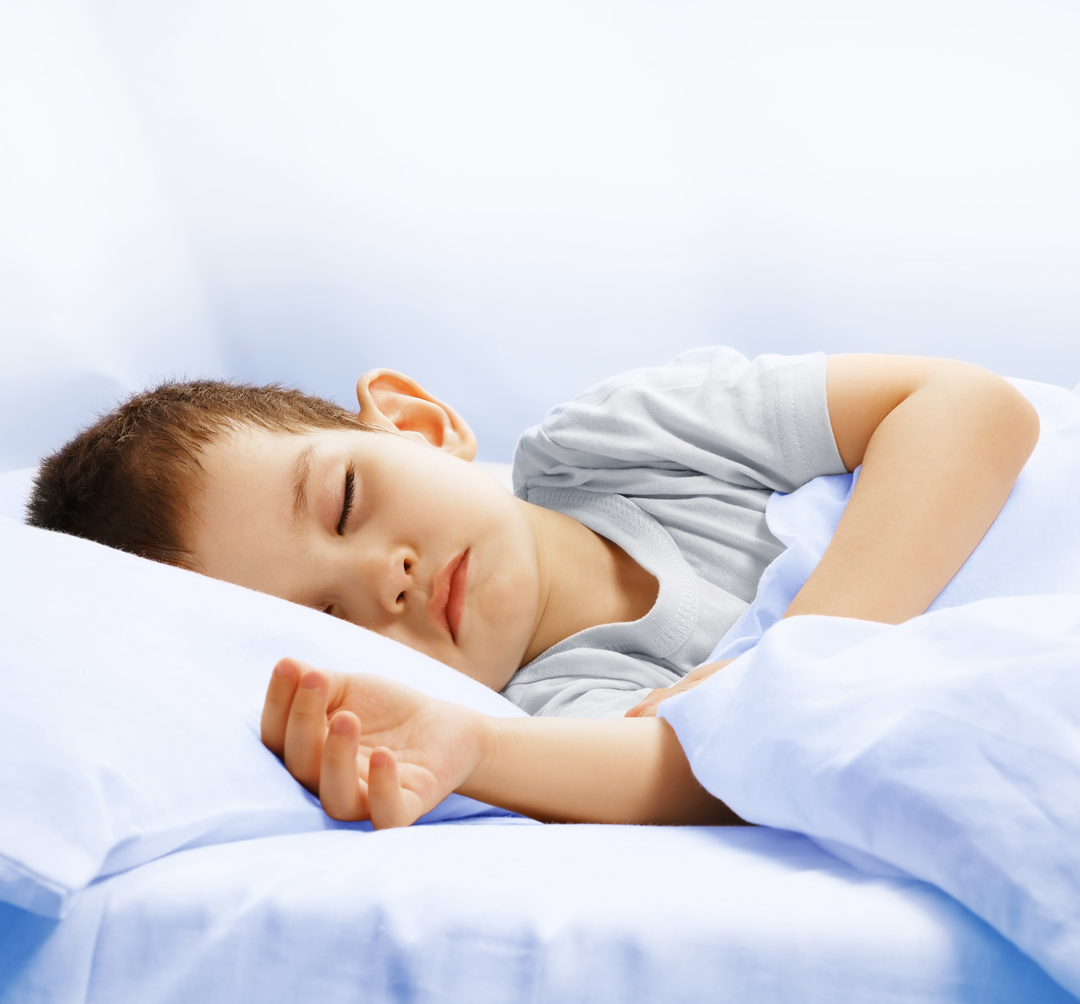 Of course, the table can not be taken as indisputable data - it's just a recommendation.But they can "push off" when drawing up an individual schedule of sleep and wakefulness.In some cases, the body requires a longer sleep than indicated in the table.This may indicate health problems, or simply be a necessity in a particular case.For example, pregnancy, emotional outbursts( exams, competitions, etc.), too much physical activity - it's all considered normal, but automatically prolongs the sleep time.Note: if suddenly, for no apparent reason, there are sleep disorders, fatigue and irritability, then you need to see a doctor.Most likely, these signs will indicate problems in health. Sleep is unconditional health.Therefore, do not ignore the emerging problems with falling asleep, intermittent sleep, a feeling of fatigue after awakening.And to drink medications of sedative and hypnotic action, too, does not make sense - they should be selected by a specialist, and the problem will not be solved by these medications.Even with small but steady sleep disorders, a complete examination is necessary - the cause of this condition can be latent in any organ / system. Yana Tsygankova, medical reviewer, therapeutist of the highest qualification category.
Of course, the table can not be taken as indisputable data - it's just a recommendation.But they can "push off" when drawing up an individual schedule of sleep and wakefulness.In some cases, the body requires a longer sleep than indicated in the table.This may indicate health problems, or simply be a necessity in a particular case.For example, pregnancy, emotional outbursts( exams, competitions, etc.), too much physical activity - it's all considered normal, but automatically prolongs the sleep time.Note: if suddenly, for no apparent reason, there are sleep disorders, fatigue and irritability, then you need to see a doctor.Most likely, these signs will indicate problems in health. Sleep is unconditional health.Therefore, do not ignore the emerging problems with falling asleep, intermittent sleep, a feeling of fatigue after awakening.And to drink medications of sedative and hypnotic action, too, does not make sense - they should be selected by a specialist, and the problem will not be solved by these medications.Even with small but steady sleep disorders, a complete examination is necessary - the cause of this condition can be latent in any organ / system. Yana Tsygankova, medical reviewer, therapeutist of the highest qualification category.

